Serving 399 students in grades Kindergarten-5, Ruskin Elementary School ranks in the top 10% of all schools in California for overall test scores (math proficiency is top 10%, and reading proficiency is top 10%).
The percentage of students achieving proficiency in math is 69% (which is higher than the California state average of 33%). The percentage of students achieving proficiency in reading/language arts is 72% (which is higher than the California state average of 47%).
The student:teacher ratio of 25:1 is higher than the California state level of 21:1.
Minority enrollment is 95% of the student body (majority Asian), which is higher than the California state average of 80% (majority Hispanic and Asian).
Quick Stats (2025)
- Grades: Kindergarten-5
- Enrollment: 399 students
- Student:Teacher Ratio: 25:1
- Minority Enrollment: 95%
- Overall Testing Rank: Top 10% in CA
- Math Proficiency: 69% (Top 10%)
- Reading Proficiency: 72% (Top 20%)
- Science Proficiency: 55-59% (Top 10%)
- Source: National Center for Education Statistics (NCES), CA Dept. of Education
Top Rankings
Ruskin Elementary School ranks among the top 20% of public schools in California for:
Category
Attribute
Overall Rank
Math Proficiency
Reading/Language Arts Proficiency
Science Proficiency
School Overview
Ruskin Elementary School's student population of 399 students has declined by 29% over five school years.
The teacher population of 16 teachers has declined by 27% over five school years.
Grades Offered
Grades Kindergarten-5
Total Students
399 students
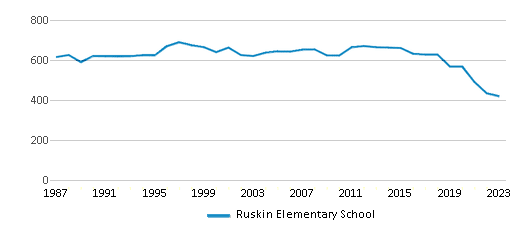
Gender %
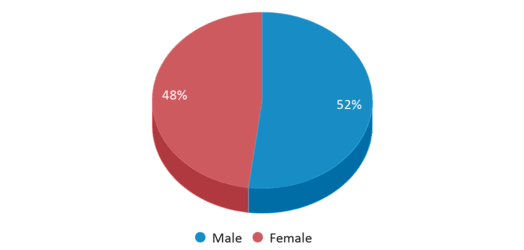
Total Classroom Teachers
16 teachers
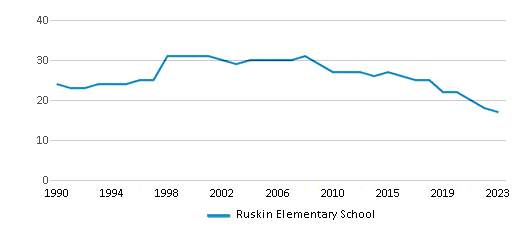
Students by Grade
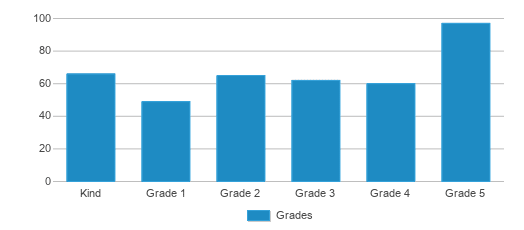
School Calendar
School Rankings
Ruskin Elementary School ranks within the top 10% of all 9,602 schools in California (based off of combined math and reading proficiency testing data).
The diversity score of Ruskin Elementary School is 0.41, which is less than the diversity score at state average of 0.63. The school's diversity has stayed relatively flat over five school years.
Overall Testing Rank
#847 out of 9602 schools
(Top 10%)
(Top 10%)
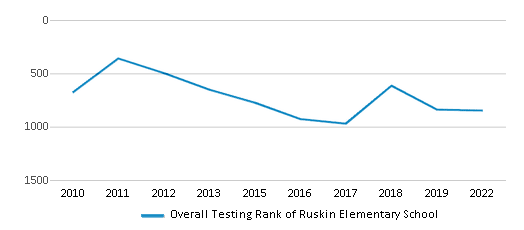
Math Test Scores (% Proficient)
69%
33%
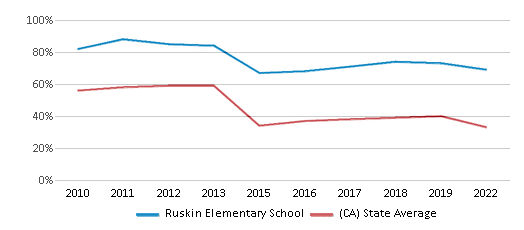
Reading/Language Arts Test Scores (% Proficient)
72%
47%
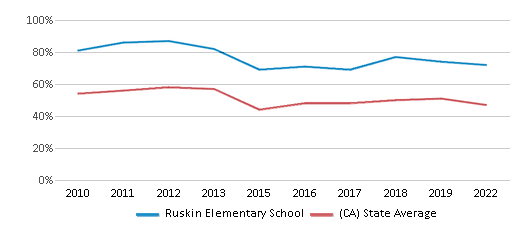
Science Test Scores (% Proficient)
55-59%
29%
Student : Teacher Ratio
25:1
21:1
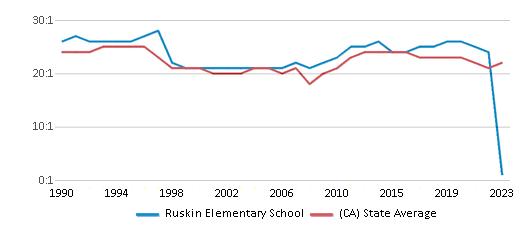
American Indian
n/a
1%
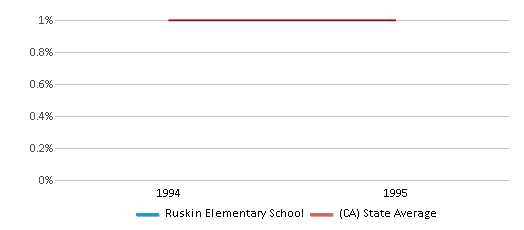
Asian
75%
12%
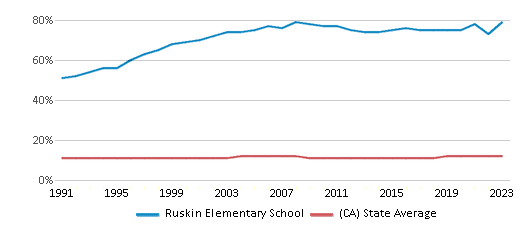
Hispanic
17%
56%
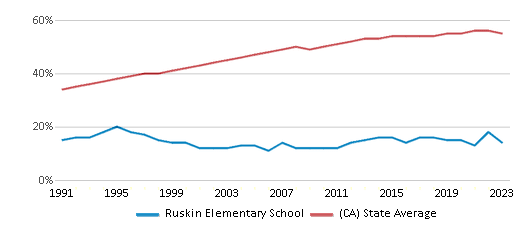
Black
n/a
5%
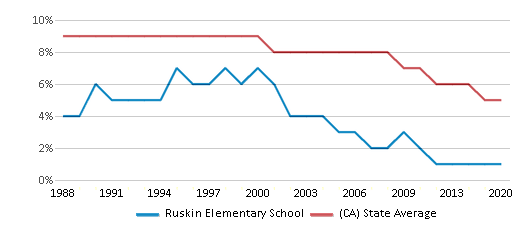
White
5%
20%
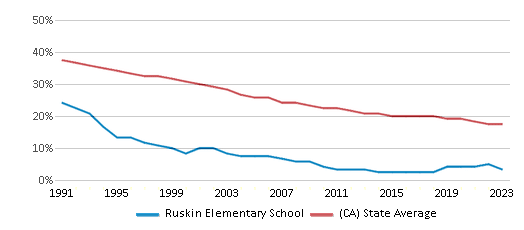
Hawaiian
n/a
n/a
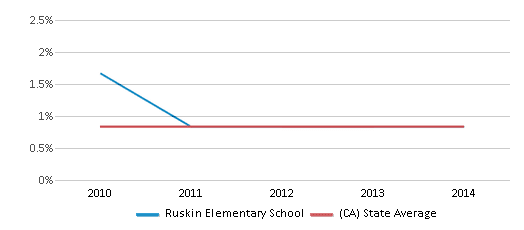
Two or more races
3%
6%
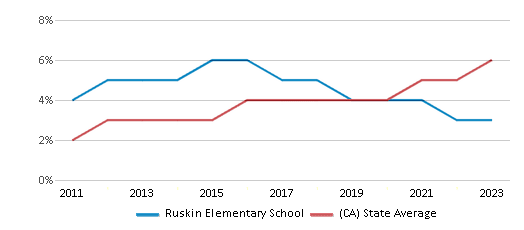
All Ethnic Groups
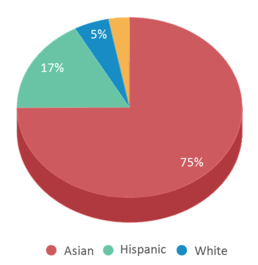
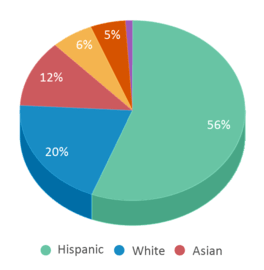
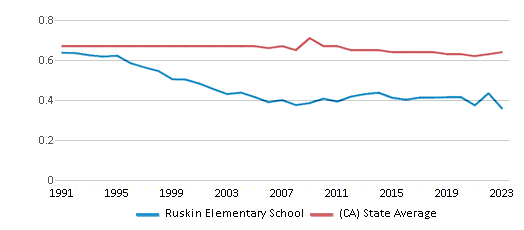
Eligible for Free Lunch
16%
54%
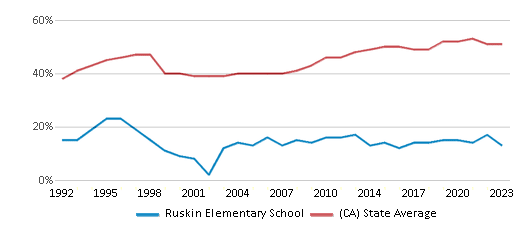
Eligible for Reduced Lunch
1%
8%
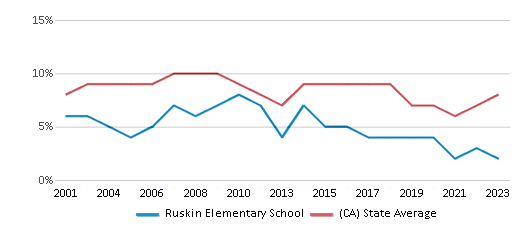
School Statewide Testing
School District Name
Source: National Center for Education Statistics (NCES), CA Dept. of Education
Profile last updated: 02/09/2025
Frequently Asked Questions
What is Ruskin Elementary School's ranking?
Ruskin Elementary School is ranked #847 out of 9,602 schools, which ranks it among the top 10% of public schools in California.
What schools are Ruskin Elementary School often compared to?
Ruskin Elementary Schoolis often viewed alongside schools like Majestic Way Elementary School by visitors of our site.
What percent of students have achieved state testing proficiency in math and reading?
69% of students have achieved math proficiency (compared to the 33% CA state average), while 72% of students have achieved reading proficiency (compared to the 47% CA state average).
How many students attend Ruskin Elementary School?
399 students attend Ruskin Elementary School.
What is the racial composition of the student body?
75% of Ruskin Elementary School students are Asian, 17% of students are Hispanic, 5% of students are White, and 3% of students are Two or more races.
What is the student:teacher ratio of Ruskin Elementary School?
Ruskin Elementary School has a student ration of 25:1, which is higher than the California state average of 21:1.
What grades does Ruskin Elementary School offer ?
Ruskin Elementary School offers enrollment in grades Kindergarten-5
What school district is Ruskin Elementary School part of?
Ruskin Elementary School is part of Berryessa Union Elementary School District.
In what neighborhood is Ruskin Elementary School located?
Ruskin Elementary School is located in the Ruskin neighborhood of San Jose, CA.
School Reviews
2 6/9/2015
There has been high teacher turnover in the past few years. Parents have concerns about the adminstration quality and responsiveness.
The Berryessa Union School District (BUSD) separates siblings into two different elementary schools and considers this is an acceptable situation despite the parents' preference to keep their children together.
Starting the 2014-15 school year, in the BUSD you are no longer guaranteed enrollment in your designated school of attendance. That means if you buy a house in the Ruskin area, your children may have to attend a different school in the district. Then, if space becomes available in later years, your child will be invited back. In past years, you were guaranteed enrollment back to your designated school. This is no longer the case. I would think that the homeowners and potential homebuyers in the area would be concerned with this policy change.
Review Ruskin Elementary School. Reviews should be a few sentences in length. Please include any comments on:
- Quality of academic programs, teachers, and facilities
- Availability of music, art, sports and other extracurricular activities
Recent Articles

What Is A Charter School?
Explore the world of charter schools in this comprehensive guide. Learn about their history, how they operate, and the pros and cons of this educational innovation. Discover key facts about charter schools, including admission policies, demographics, and funding, as well as what to look for when considering a charter school for your child.

10 Reasons Why High School Sports Benefit Students
Discover the 10 compelling reasons why high school sports are beneficial for students. This comprehensive article explores how athletics enhance academic performance, foster personal growth, and develop crucial life skills. From improved fitness and time management to leadership development and community representation, learn why participating in high school sports can be a game-changer for students' overall success and well-being.

February 05, 2025
Understanding the U.S. Department of Education: Structure, Impact, and EvolutionWe explore how the Department of Education shapes American education, from its cabinet-level leadership to its impact on millions of students, written for general audiences seeking clarity on this vital institution.





